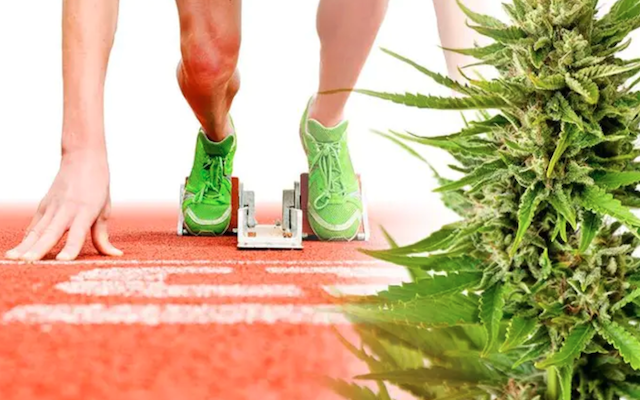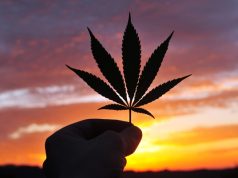Olympic fever has us in its grips. For many, Olympians represent the ultimate bastion of athletic ability–a supreme showcase of the physical potential of the human body. This year, for the very first time in the history of the Olympics, elite athletes are allowed to use cannabidiol (CBD).
For high-level athletes, there’s an ongoing quest for performance-enhancing substances that can provide that elusive edge. With mere milliseconds sometimes defining the difference between a gold and silver medal, any legal substance that can provide that extra little push is highly sought after. But finding such a natural edge isn’t easy. Supplements must conform to stringent anti-doping laws and also be safe.
Is CBD legal at an elite level?
While the World Anti-Doping Agency (WADA) regards THC, the other major cannabinoid present in cannabis, as an illicit substance, CBD isolate is permitted as a legal substance. WADA removed cannabidiol from its banned list in January 2018. Athletes consuming CBD must ensure they’re using approved CBD isolates, however, as the presence of even trace amounts of THC in full spectrum CBD products can be sufficient to fail a urine test.
A recent 2020 study found that athletes who use CBD products may also be unwittingly ingesting prohibited minor cannabinoids–such as CBG, CBN, CBC, and CBDV– present in broad-spectrum or full-spectrum CBD products. The study’s authors reported that athletes who use CBD need to be thoroughly educated about the risks associated with using CBD to avoid unintentionally violating anti-doping rules.
CBD: A safe supplement for elite athletes?
CBD is a non-intoxicating cannabinoid that has anti-inflammatory, neuroprotective, anti-anxiety, and analgesic properties: characteristics that are ideally suited to athletes looking to enhance their physical and mental performance.
Many high-level athletes–and those of us who simply get a kick out of training hard–believe that CBD represents a game-changing supplement. Indeed, at Tokyo 2020, athletes such as US footballer Megan Rapinoe, hurdler Devon Allen, softballer Haylie McCleney, and basketballer Sue Bird, have shared that CBD forms part of their regimen. Athletes across diverse sporting codes have claimed benefits as varied as accelerated recovery from injury, sounder sleep, and reduced muscle pain.
According to Eloise Theisen, the President of the American Cannabis Nurses Association (ACNA) and the Chief Executive Officer of Radicle Health, there’s certainly evidence that athletes can benefit from using CBD as a supplement but still much that is unknown.
“Research is still evolving regarding CBD’s therapeutic benefits and there is some evidence to suggest that it can help with pain, insomnia, anxiety, and muscle spasms,” says Theisen.
“Lately, we are seeing more athletes looking to use CBD for muscle recovery, pain relief, as a mood stabilizer and sleep support,” she explains. “CBD can offer many benefits without too many side effects–from a safety perspective, CBD has fewer side effects than prescription and over the counter remedies and the World Health Organization has recognized CBD as safe, with no potential for abuse.”
However, Theisen also cautions that we need more research to better understand therapeutic uses and dosages, as well as long-term benefits and side effects.
So, what exactly does science say? How can CBD specifically support Olympic level athletes–and those of us aspiring to reach such great heights?
According to a 2020 review in Sports Medicine, and another 2020 review published in Pharmacological Research, CBD may support athletes in the following diverse ways.
Managing performance anxiety, stress and fear-conditioning
Everyone experiences anxiety-provoking situations–but athletes often confront these situations more frequently than the general population. Performance anxiety before an event can cause sleeplessness, increase energy expenditure, and impair nutritional intake.
Most critically, anxiety can impact negatively on performance itself, and inhibit recovery after an event. CBD has been shown to decrease perceived anxiety before, during, and after situations that provoke anxiety. Interestingly, preclinical studies in animals also suggest that CBD may also improve fear memory processes, by impairing the acquisition of fear. This particular property could be beneficial for athletes experiencing stress, fear, or trauma after a sport-related injury, such as a concussion.
Protecting against gastrointestinal damage
Athletes who train hard can reduce oxygen and impede nutrient delivery to their gastrointestinal (GI) tract. GI stress can negatively influence exercise performance and recovery due to nausea, vomiting, and impaired nutritional uptake.
The 2020 Sports Medicine study reported that CBD may protect against gastrointestinal damage by reducing tissue damage and restoring the permeability of the intestine. A permeable intestine is more readily able to absorb nutrients from food.
Reducing inflammation
CBD may help alleviate inflammatory pain associated with tissue damage and neuropathic pain caused by nerve damage or irritation. This could represent a critical advantage for endurance athletes, since repetitive or extended workouts can spark inflammation and irritation in peripheral nerves.
Based on the pharmacology of how CBD interacts with the body’s cannabinoid receptors, CBD may also help with the management of pain, general inflammation, or swelling caused by injury.
The Pharmacological Research study reported that CBD could become an alternative to non-steroidal anti-inflammatory drugs, opioids or corticosteroids. The authors also suggested that despite a present lack of studies specifically exploring the use of CBD in managing sports injuries, the data indicates the potential use of the cannabinoid in managing osteoarthritis, delayed onset muscle soreness (DOMS), and overuse injury.
Boosting bone health
Healthy bones are essential for athletes, but bone health is sometimes compromised by traumatic injuries or inadequate energy availability. Research in the Sports Medicine review suggests that the use of CBD may assist in healthy bone deposition, and the healing of fractures.
Offering neuroprotective properties
CBD’s neuroprotective properties may be therapeutic in counteracting the harm that can occur following a sports-induced concussion. These concussions are considered a variation of mild traumatic brain injury and can lead to serious long-term complications such as brain damage.
The authors of the Pharmacological Research study emphasize recent research in an animal model that demonstrated the utility of CBD in treating symptoms (such as depression, or aggression) arising from mild traumatic brain injury.
CBD oil may also help to counteract neuronal damage in the brain’s prefrontal cortex. The cannabinoid additionally inhibits oxidative stress and neuroinflammation, conferring further neuroprotective benefits. Such findings are promising, particularly because there are currently no pharmacotherapies available to manage mild traumatic brain injury.
Supporting sleep and wake cycles
There’s still contention regarding the effects of CBD on sleep. Anecdotal reports often argues for its efficacy, while data drawn from human populations suggests negligible effects. Research in animal models has discovered that CBD may induce sleep and act as a wake-promoting agent.
These seemingly opposite effects, which are known as biphasic, depend on the dose used. Lower doses of CBD appear to promote wakefulness, while higher doses seem to sedate. Both properties may be particularly beneficial for athletes. Securing a sound night of slumber can be invaluable before a big race, while remaining awake and alert is more useful for athletes participating in long-distance events.
The bottom line? While the mechanisms underlying these CBD properties need to be clarified, these preliminary observations spotlight CBD as a possible tool for supporting athlete sleep patterns.
The final word
Clearly, more studies investigating the effects of CBD among human athlete populations is needed to more accurately assess its utility and long-term effects.
Both the Sports Medicine and Pharmacological Research reviews emphasize the preliminary nature of their findings, suggesting while CBD offers promise for athletes, more conclusive research is required.
In the meantime, however, while Olympic athletes such as Rapinoe, McCleney and Allen tout the benefits of CBD, the profile of the cannabinoid is set to continue rising.






